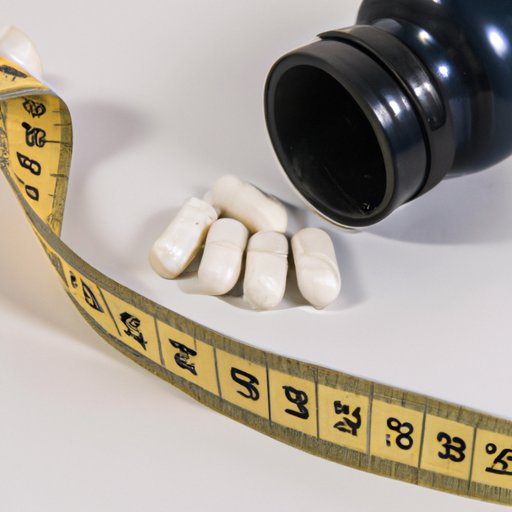
I. Introduction
If you’ve been looking to shed a few pounds, you might have come across discussions about using Adderall as a way to lose weight. As a prescription drug used primarily to treat attention deficit hyperactivity disorder (ADHD), the idea of repurposing it for weight loss can be tempting. However, is it a safe and effective way to lose weight? In this article, we’ll explore the impact of Adderall on the body and examine the pros and cons of using it for weight loss. We’ll also review alternative weight-loss methods and address the ethical and legal considerations of using Adderall for non-medical purposes.
II. An Overview of Adderall and its Effects on the Body
Before discussing the impact of Adderall on weight loss, it’s important to have a basic understanding of what it is and how it works in the body. Adderall is a psychostimulant medication that increases the levels of dopamine and norepinephrine in the brain. This boost of neurotransmitters leads to increased focus, alertness, and productivity.
Common uses of Adderall include treating ADHD and narcolepsy, but it’s also been prescribed off-label as a weight-loss aid due to its appetite suppression and metabolism-boosting effects. The drug works by suppressing appetite, making it easier to stick to a reduced-calorie diet. Additionally, it can increase metabolism, which leads to more calories burned even when the body is at rest.
III. Personal Experiences with Adderall and Weight Loss
Although Adderall may be an effective weight-loss aid for some people, the practice is not without potential risks and downsides. Personal accounts of Adderall use for weight loss vary, with some individuals reporting successful weight loss and others experiencing adverse side effects.
One individual shared their experience on Reddit, stating that Adderall helped them lose 30 pounds in three months. However, they cautioned that the drug made them feel jittery, anxious, and irritable, and they ultimately stopped using it due to these negative side effects.
Another individual on a weight-loss forum reported losing 50 pounds over six months with the help of Adderall. They found that it curbed their hunger and allowed them to focus on healthier food choices. However, they also acknowledged the risks of addiction and the potential for negative side effects like insomnia and anxiety.
While personal experiences with Adderall and weight loss vary, it’s crucial to consider the potential drawbacks and side effects of using the drug for this purpose.
IV. A Breakdown of Adderall’s Side Effects and Risks
While Adderall may help some people lose weight, it’s essential to consider the potential side effects and risks associated with the drug. Common side effects include decreased appetite, difficulty sleeping, rapid heartbeat, and nervousness or restlessness. In more severe cases, individuals may experience hallucinations, delusions, and psychomotor agitation.
Extended use of Adderall can also lead to addiction, dependence, and withdrawal symptoms when stopping use. Additionally, long-term use can lead to cardiovascular issues, including high blood pressure, heart attack, and stroke.
V. A Review of Scientific Studies on Adderall and Weight Loss
While personal accounts of Adderall’s impact on weight loss are compelling, scientific research on the topic is limited and often focuses on the drug’s broader effects on cognition and behavior. One study found that Adderall increased the resting metabolic rate and energy expenditure in adults with ADHD, leading to a modest reduction in body weight over time.
Another study found that Adderall increased energy expenditure and fat oxidation in healthy adults but also led to increased heart rate and blood pressure. The study concluded that these effects may outweigh the potential benefits of using Adderall for weight loss.
Overall, research on Adderall’s impact on weight loss is limited and often focuses on specific populations or conditions. More research is needed to fully understand the drug’s effect on weight loss.
VI. Examining the Benefits and Drawbacks of Using Adderall for Weight Loss
While Adderall may be an effective way to jumpstart weight loss, the potential side effects and risks associated with its use should not be overlooked. Short-term use can lead to weight loss, but long-term use can cause serious health problems.
Additionally, using Adderall as a weight-loss aid can create a dependence that may lead to abuse and addiction. Individuals should always consult with their healthcare provider before considering Adderall or any other drug for weight loss.
VII. Alternative Weight-Loss Methods to Adderall
Fortunately, there are many alternative methods for weight loss that don’t come with the risks associated with Adderall use. These methods include healthy eating habits, exercise, and stress reduction.
Eating a nutrient-dense diet and monitoring calorie intake can promote sustainable weight loss. Regular exercise, such as cardio and strength training, can increase metabolism and burn more calories. Additionally, incorporating stress-reducing activities like yoga or mindfulness meditation can help prevent emotional eating and promote a healthy relationship with food.
VIII. The Legality of Using Adderall for Weight Loss
It’s essential to note that misusing Adderall for weight loss can lead to serious legal and ethical consequences. The drug is classified as a Schedule II controlled substance by the United States Drug Enforcement Agency, and remains illegal for non-medical use.
Individuals caught buying or selling Adderall for non-medical purposes can face serious legal punishments, including hefty fines and imprisonment. Additionally, any physician caught prescribing Adderall for non-medical purposes can lose their license and face arrest.
IX. Conclusion
While Adderall may be an effective way to lose weight in the short term, the potential risks and side effects associated with its use shouldn’t be overlooked. There are also alternative, safer methods for weight loss that promote overall health and well-being. If you’re considering using Adderall for weight loss, consult with your healthcare provider and consider all the potential risks before making a decision.
Overall, it’s important to prioritize health and well-being over quick fixes or fad diets. Sustainable weight loss requires a comprehensive approach that addresses all aspects of health, including physical and emotional well-being.




